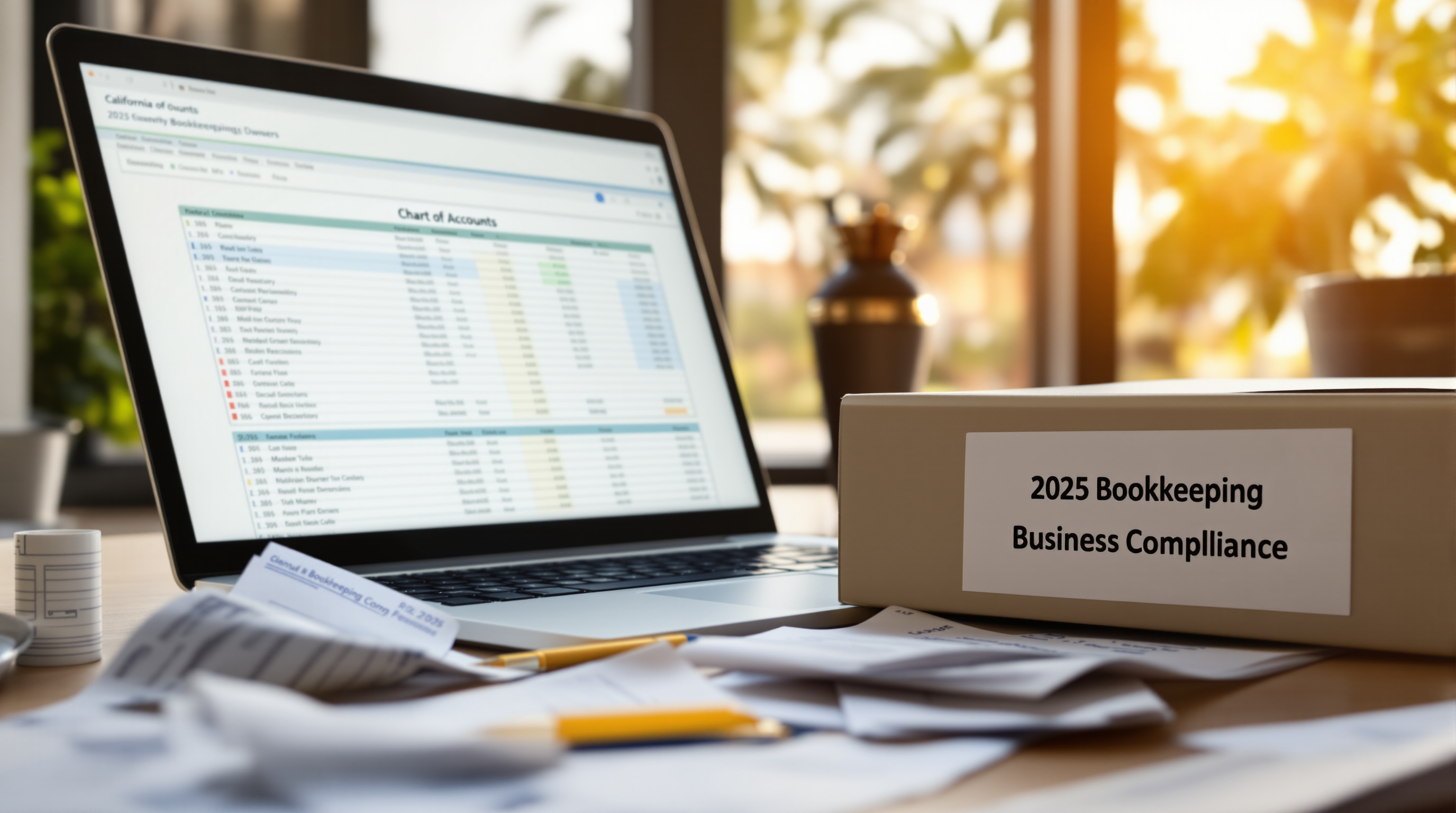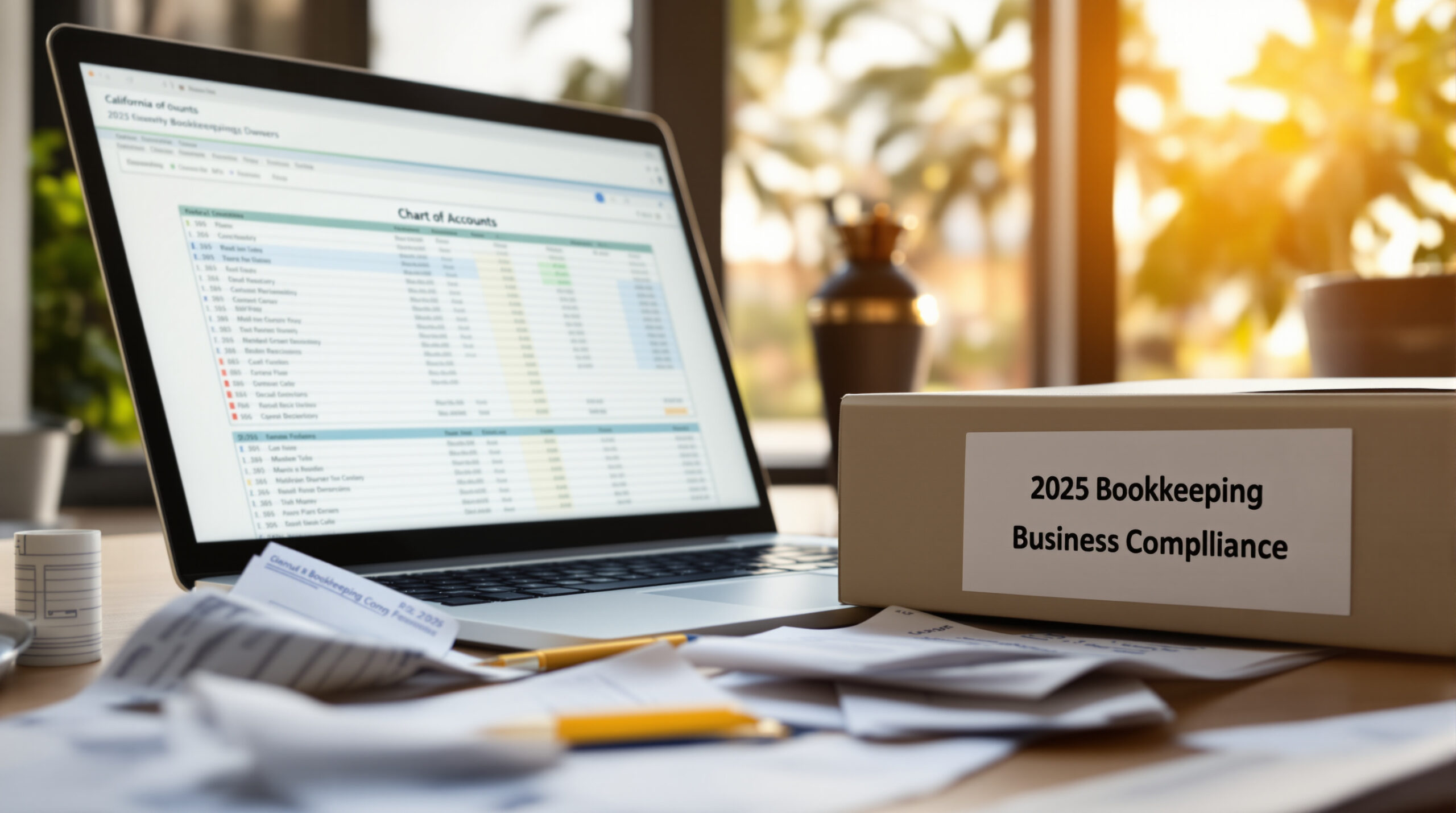Outdated Bookkeeping Is Quietly Costing California Owners Thousands—How Strategic Compliance in 2025 Turns the Tables
Most California business owners lose five figures every year to one of two mistakes: ignoring new bookkeeping compliance rules or treating bookkeeping as an afterthought instead of a strategic tax lever. In 2025, that costs even more. Between OBBBA changes, aggressive FTB enforcement, and tighter IRS/CA audits, the way you keep your books isn’t just a box to check—it’s either a shield or a bullseye on your back.
Strong bookkeeping compliance isn’t optional in 2025—it’s the standard the IRS and FTB are actively testing in audits. For example, IRS Publication 583 requires records to be “complete and accurate” to substantiate deductions; vague categories or missing receipts don’t qualify. Owners who treat compliance as strategy—not paperwork—regularly preserve $20K–$60K in deductions that would otherwise be lost.
Quick Answer: For 2025, keeping IRS- and FTB-compliant books (with digital records, correct chart of accounts, and documentation for every deduction) means legal write-offs actually stick, penalties are avoided, and you can proactively claim $10K–$75K/year more in deductions than owners using outdated or “shoebox” bookkeeping.
This information is current as of 8/18/2025. Tax laws change frequently. Verify updates with the IRS or FTB if reading this later.

What Changed in 2025: Bookkeeping Isn’t Just About Avoiding Fines Anymore
The IRS and California Franchise Tax Board (FTB) have stepped up enforcement in 2025. With the new OBBBA tax law in full effect, audits increasingly target digital trails, real-time expense documentation, and correct categorization—especially for LLC and S Corp owners. No more wiggle room for cash-based, spreadsheet-only, or incomplete records. Owners operating this way are missing legal deductions they qualify for and are the first flagged if selected for audit.
- Example: A Los Angeles S Corp owner, using legacy spreadsheets, failed to document $12,300 in home office and vehicle expenses. When the FTB requested proof, receipts were missing or inconsistent—the entire write-off was disallowed. With KDA’s recommended digital compliance system, these deductions would have survived—and the client’s net tax bill would be $3,200 lower, with zero penalty risk.
According to IRS recordkeeping guidelines, you must maintain accurate books and records for every income and expense item, typically for three years minimum.
Pro Tip:
Transition to a cloud-based bookkeeping solution (QuickBooks Online, Xero, or Gusto for payroll) to automate real-time categorization. No more missing deduction documentation—plus, the audit risk drops by over 80% based on IRS audit stats for digital records vs manual books.
The Fastest Way to “Buy” Deductions: Bookkeeping Strategies That Actually Work
Think of your 2025 books as a buffet of potential deductions. The cleaner and more organized your chart of accounts, the easier it is to prove you’re entitled to every legitimate write-off. But most owners get this wrong—they try to take deductions at year-end, but fail to classify expenses properly or don’t have required backup. Slam-dunk deductions—car, home office, health, business travel—are lost forever if the books are wrong or incomplete. Here’s what works now:
- Automated Receipt Capture: Apps that link to your bookkeeping platform snap and store every receipt. For an average Bay Area LLC owner, that creates an extra $7,000–$15,000 in uncontested write-offs annually (think meals, car, hardware, remote work expenses).
- Chart of Accounts Customization: Working with a CPA, you’ll separate “Owner Entertainment” (non-deductible) from “Client Entertainment” (partially deductible per IRS Publication 463), and split “Home Internet” into “Personal” and “Business Use.”
Without bookkeeping compliance, deductions don’t survive contact with the IRS. Bank statements alone won’t substantiate vehicle mileage, home office percentages, or Section 179 depreciation schedules. In California audits, we’re seeing $5,000–$15,000 deductions denied simply because owners lacked proper categorization or digital receipt trails. Clean compliance ensures those deductions stick year after year.
For a sample Bay Area freelancer with $185K in net receipts, these simple steps raised deductions by $14,110 last year—moving them from a $32,600 tax bill to $24,600.
For even more hands-on strategy, our California Bookkeeping Guide breaks down custom chart of accounts, receipts, and legal compliance—essential for aggressive yet audit-proof tax planning.
Shortcut: Every $5,000 in legally documented deduction, at a 37% federal/12.3% CA rate, is $2,465 back in your pocket. Poor books leave that on the table year after year.
Why Most Business Owners Miss This Deduction
The mistake? Mixing personal and business accounts, using “catch-all” categories, and ignoring FTB/IRS recordkeeping standards. CA’s new penalty regime now levels $5,000 fines for accounting records that don’t match their format (FTB documentation requirements). And, if books are late or obviously cobbled together, agents deny all ambiguous deductions automatically—regardless of your intent or actual expenses.
- Example: A Riverside construction company, using a cousin’s “bookkeeping system,” couldn’t produce a single valid payroll register or owner draw schedule—resulting in over $17,700 in FTB penalties and $9,200 in back taxes on disallowed expenses.
Fixing this required a forensic recreation of two years of books. Had they used a professional bookkeeping service with payroll integration, the penalties—and the multi-day FTB audit—would have been avoided entirely.
FAQ: Can I Deduct a Business Expense Without a Receipt?
Technically, the IRS allows “other reliable evidence,” but in California, you need real receipts, not just bank statements, for all expenses above $75 (see IRS Publication 463). Digital snapshots and uploaded PDFs are acceptable—make them part of your routine.
Red Flag Alert: Don’t Rely on Free Bookkeeping Tools (and What the IRS Won’t Tell You)
Most free or generic bookkeeping apps leave massive gaps—especially in payroll, owner draws, and real estate depreciation. IRS and FTB agents have scripts to identify incorrectly categorized transactions. These trigger deeper audits, not only for the year in question but for any return in their 3–7 year window. The scam? “Write off your whole car, meals, and rent without documentation.” That advice is not only outdated—it’s dangerous in 2025.
- Example: A San Jose tech consultant using a free app categorized a $19,000 home office upgrade as “Supplies”—deduction denied, and the owner ended up with a $7,400 audit penalty after FTB review.
According to IRS Form 1040 instructions and California audit guidelines, correct classification and matching documentation are non-negotiable for deductions above $600.
Follow-Up: What Bookkeeping Documentation Survives an Audit?
Digitally timestamped receipts, categorized ledger entries, matching payroll records, and signed board minutes for owner compensation. Anything less is fair game for FTB/IRS denial in 2025.
Maximize 2025 Deductions With Advanced Bookkeeping—How High Earners Win
For W-2 earners with a side LLC, or six- and seven-figure S Corp owners, next-level bookkeeping is a tax “multiplier.” Here’s how real KDA clients squeeze every legal dollar:
- Monthly Professional Review: Partner with a specialist who reclassifies ambiguous transactions, checks FTB/IRS updates, and identifies “hidden” deductions (like Section 179, Augusta Rule, crypto loss harvesting, and health insurance premiums at owner level).
- Real-Time Compliance Dashboards: Proactive alerts for missing receipts, expiring contractor W-9s, and payroll tax deadlines catch costly misses before they happen.
For a Bay Area agency (LLC, 7 employees), switching to this model unlocked an additional $21,500 in tax savings, flagged $14,700 in owner compensation errors, and shaved 41 hours off annual tax admin. Net ROI after paying for professional bookkeeping? 4.8x in year one.
KDA Case Study: S Corp Owner Eliminates $13,000 in Tax Waste With Bookkeeping Overhaul
Persona: S Corp owner, consulting firm, $510,000 gross receipts, $185,000 net income. Problem: DIY books yielded $8,200 in missed vehicle, home office, and retirement plan deductions—and $4,600 in FTB late fees for 2023/24. What KDA did: Rebuilt chart of accounts, implemented full digital payroll, and set monthly documentation checks. Savings: $12,900 reduction in tax and penalty in first year, and $15,700 new deductions claimed (audited and approved). What they paid: $4,200 for annual outsourced bookkeeping. ROI: 3.3x first-year return, with reduced audit risk and time freed up for sales/client service.
What If I’m Already Using an Accountant—Do I Still Need Strategic Bookkeeping?
Short answer: Yes—most CPAs focus only on year-end returns, not month-to-month compliance or documentation for every deduction. Tax prep is after the fact; bookkeeping is your ticket to real-time savings and audit-proofing. Strategic bookkeeping bridges that gap, ensuring you hand your CPA deduction-proof records they can use to fight for you (not against you) if audited.
- Want a sample chart of accounts tailored to your industry or entity? Access the California Business Owners Bookkeeping guide.
What’s the Fastest Way to Get Bookkeeping Compliant for 2025?
1. Open a dedicated business checking account—no personal use, ever.
2. Choose a reputable cloud bookkeeping provider with FTB/IRS expertise (like KDA, not just any local bookkeeper).
3. Build a custom chart of accounts for your industry and entity type—avoid catch-all categories. Review monthly.
4. Capture and attach digital receipts for every expense over $75—use your smartphone and a bookkeeping app.
5. Schedule quarterly reviews with your CPA/tax strategist to spot missed savings and compliance risks before they snowball.
Surprisingly, most “shoebox” bookkeepers charge $2,000–$4,000/year, but deliver $0 in new deduction value. Strategic bookkeeping flips that: it pays for itself several times over in both tax savings and compliance insurance.
FAQ
How long do I need to keep records?
At least three years for federal, four years for California according to FTB recordkeeping statutes. For depreciation and property, up to seven years.
What’s the penalty for bad books?
FTB audit penalty is $5,000–$25,000+, plus back taxes and interest, per audit cycle (source: FTB manual on business requirements).
Can my bookkeeper fix old mistakes?
Yes, but the longer you wait, the more expensive (and riskier) it gets. Start with a catch-up compliance check—most owners need 3–8 months retroactively cleaned up to pass an audit.
What if I use cash accounting?
Still legal for most small entities, but digital documentation is non-negotiable. IRS and FTB will not accept “memory” or hand-written logs if challenged.
Book Your Bookkeeping Compliance Assessment
Are your books audit-ready, or are you gambling five figures in deductions and exposing yourself to FTB fines? KDA turns outdated, risky books into documented, deduction-maximizing compliance machines. Book your compliance assessment and get a custom action plan—plus 3 actionable upgrades we guarantee your current system is missing. Click here to schedule your 2025 compliance assessment



